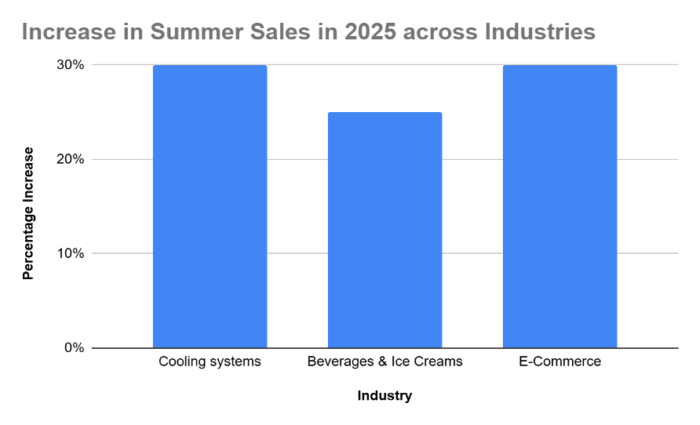Strategies for MSMEs to Capitalize on Summer Retail Sales Growth
- An early onset of summer is spiking demand in FMCG, retail, hospitality, travel, and textiles categories
- Cooling appliances like fans, air-coolers, and air-conditioners witnessing a 30% year-on-year increase in 2025.
- Beverage and ice creams segment are registering 25% sales growth
- E-commerce platforms have seen a 30% increase in summer product sales
- Summer season also brings higher operational costs, inventory management challenges, cash flow instability
- Financing solutions can ensure business continuity, strategic inventory planning, and bridging the gap between supplies and expenses
As the temperature rises during summer, so does consumer spending. The season is a commercial catalyst, with sales shooting up across various sectors, including FMCG, retail, hospitality, travel, and textiles. In 2025, the demand cycle has started sooner, with the early onset of summer and the heat soaring in February. What does it mean for businesses? Retail sales in most categories above will likely increase by approximately 25%.
Here’s a look at how the summer season will impact different enterprises, which includes MSMEs:

- Summer contributes to approximately 60% of annual sales for cooling systems like fans, air-coolers, and air-conditioners, which could see a 30% year-on-year increase[1].
- Beverage makers expect over 20% growth[2].
- Ice cream brands have already clocked in up to 40% increase in sales[3].
- E-commerce platforms in India have seen a 30% increase in summer product sales, including summer apparel and light clothing.[4]
The summer season also brings certain operational challenges that MSMEs need to plan for—which can be effectively addressed through strategic planning.
1. Increased Operational Costs:
High electricity bills, rising supply chain costs, and the need for additional staff can strain working capital, especially for micro and small businesses. The heavy use of cooling systems in retail and warehouses, transportation of perishable goods in some cases, and seasonal hiring also strain operational budgets. A loan allows business owners to keep shelves stocked, maintain product quality (especially for temperature-sensitive segments), and hire or retain an adequate and efficient workforce to ensure business continuity.
To manage these effectively, business owners can opt for structured loans that help maintain stock levels, preserve product quality—especially for temperature-sensitive items—and ensure adequate staffing. This financial support ensures smooth operations without compromising service or customer experience during peak demand.
2. Cash Flow Instability
The seasonal nature of summer sales often results in irregular cash flows — with periods of high revenue followed by slower weeks, making it challenging to manage ongoing operational costs. In such scenarios, maintaining strong relationships with both suppliers and customers becomes essential to ensure timely payments and a healthy cash cycle.
Additionally, to manage increased inventory demands and scale operations effectively, MSMEs can consider taking structured loans from regulated NBFCs like Protium. These solutions help bridge the gap between expenses and receivables, ensuring business continuity during peak and off-peak periods.
3. Inventory Management Challenges:
Due to the significant demand, managing the inventory of seasonal goods is critical. For instance, a small retailer preparing for a heatwave or a beverage distributor anticipating large orders requires immediate access to funds for inventory purchases. Without proper forecasting and adequate financing, businesses risk either overstocking or experiencing stockouts, both of which negatively impact profitability.
MSMEs must dig into past years’ sales data to forecast demand more accurately and avoid over-purchasing. Strategic inventory planning, tied closely to hyperlocal weather patterns and festival calendars, can ensure lean yet responsive supply chains that help meet demand without wastage or delays.
4. Marketing & Sales Tactics Requirements
A well-timed marketing and sales campaign can go a long way in converting seasonal interest into real business growth. Targeted marketing strategies and digital campaigns—such as summer-themed packaging, ‘beat the heat’ offers, or influencer collaborations—can boost visibility and drive customer engagement.
Hosting pop-up events in key locations can serve as an additional revenue driver—boosting brand visibility, testing new product lines, and tapping into the summer crowd with time-limited, high-impact engagement.
Additionally, MSMEs should also adopt digital payment solutions that offer a faster turnaround of capital and help stabilize day-to-day operations. Smart diversification of products or services—such as a café launching summer smoothies or a clothing brand offering breathable cotton lines—can also help turn seasonal trends into fresh revenue streams.
Being summer-ready doesn’t just mean ramping up production but also handling the above factors wisely. Also, with the increase in demand for FMCG and consumer durables during summer, MSMEs must know what kind of financial support they can consider to rake in profits. For example:
- Business Loans to manage daily expenses, restock inventory, or run marketing campaigns. These are great for FMCG shops, kirana stores, or apparel or clothing stores, which are expecting more customers or online sales during summer.
- Machinery and Equipment Loans are useful for businesses that need refrigeration, cooling, or transport equipment. Dairy businesses, cold storage units, and even event planners who plan summer weddings can use these loans to upgrade or buy essential machines.
- Loan Against Property (LAP) allows businesses to use their property to get approval for large-ticket loans. These funds can be strategically invested in expanding business presence across online and offline channels, amplifying marketing efforts, and scaling operations effectively.
By adopting strategic financial planning, leveraging appropriate loan products, and optimizing operational efficiencies, businesses can effectively navigate the summer season and achieve sustainable growth.
[1] Jefferies Research Report 2025
[2] Gujarat Cooperative Milk Marketing Federation
[3] Indian Ice Cream Manufacturer’s Association (IICMA)
[4] Bloom Agency – E-Commerce Statistics for India in 2024

